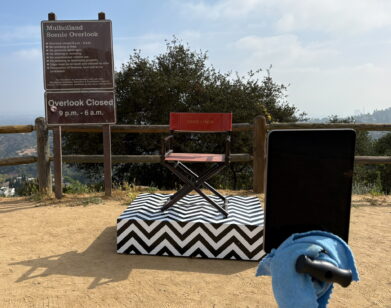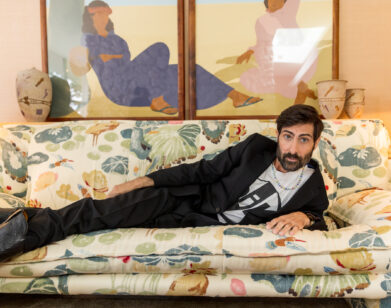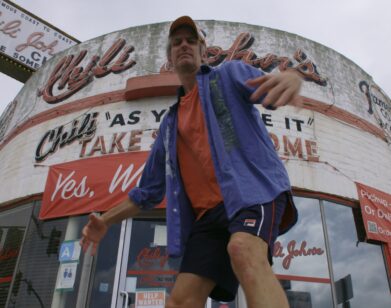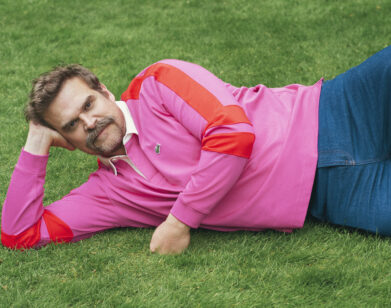George Tillman Jr.’s American Idols
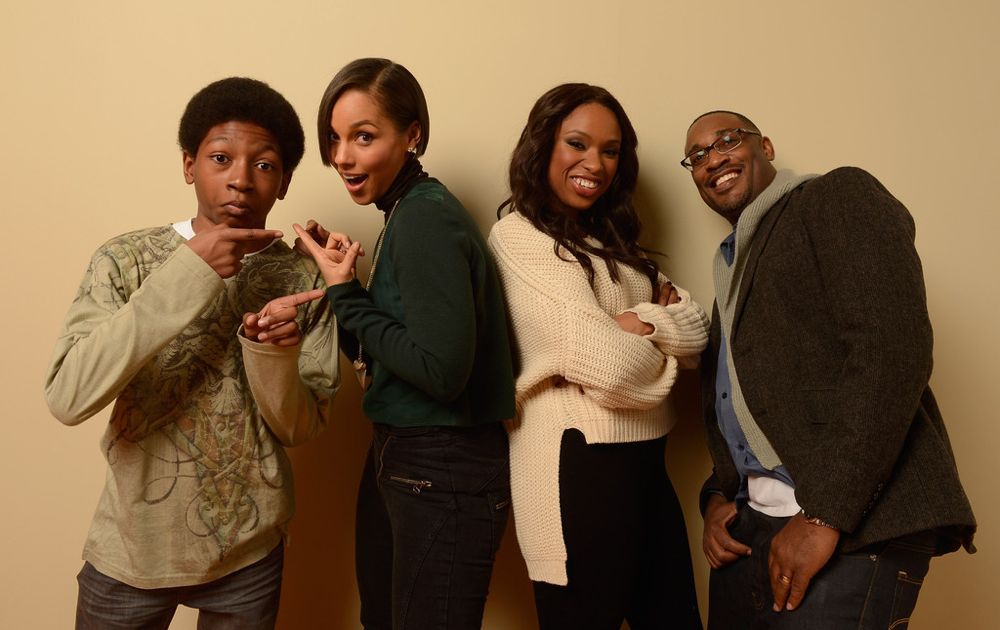
ABOVE: (LEFT TO RIGHT) ACTOR SKYLAN BROOKS, FILM SONGWRITER ALICIA KEYS, ACTOR JENNIFER HUDSON, AND DIRECTOR GEORGE TILLMAN JR. AT SUNDANCE.
Covered in tattoos, wearing a bright pink bra and little else, Jennifer Hudson wraps a strap around her upper arm, pulls it tight, and shoots up. It’s near the beginning of director George Tillman Jr.’s new film, The Inevitable Defeat of Mister and Pete, and Hudson is playing Gloria: a prostitute, a junkie, and a negligent mother to 13-year-old “Mister” (Skylan Brooks).
It’s a familiar scene for Mister, who has just come home for the first day of summer holidays. He’s sick of it, but he doesn’t have much of a choice; his only friend is his neighbor, the tiny Pete (Ethan Dizon), whose mother is in even worse shape than Gloria. But Mister has a plan: on August 7, there’s an open casting call for child actors, and Mister’s determined to get discovered, move to Beverly Hills, and become a famous. Until then, all he can do is practice his audition monologue (a profanity-filled speech originally recited by Steve Buscemi in the film Fargo), read up on Method acting, and try not to get in trouble. Gloria, passed out in her underwear, is the only thing keeping Mister and Pete from the dreaded boys’ group home, Riverview.
“Escape is the theme for everybody in the movie,” director George Tillman Jr. explains. Mister loves Fargo because “it’s the farthest away from Brooklyn you can get, and it shows how far away he wanted to get away from his circumstances,” he continues.
Tillman is no stranger to working with children: the ensemble film that made him famous, Soul Food (1997), is narrated by an innocent yet insightful middle schooler, Ahmad. His 2009 film, the Biggie Smalls biopic Notorious, featured Christopher Wallis Jr. as a young version of his father. For the first time, however, children are more than a cute plot ploy, they are at the center of Tillman’s narrative.
We sat down with Tillman after Mister and Pete‘s Sundance debut to talk about resilience, biopics, Miles Davis, and actor Anthony Mackie.
EMMA BROWN: Have you been to Sundance before?
GEORGE TILLMAN JR.: This is my first time. I was here 14 years ago as a fan, just as a fan. It was smaller. [laughs]
BROWN: What made you want to tell this story? And why in New York?
TILLMAN: I’ve never seen a film about two kids in the projects, alone—just that idea of survival. I love telling stories from a kid’s point of view, because they don’t really see all the obstacles in front of them. They’re resilient, and sometimes adults can steal that from them. [Children] don’t know all the issues that can happen in front of them, so they just keep moving, keep going. I just fell in love with the story, with their determination and their friendship.
BROWN: Do you think that Pete and Mister will still be friends in 10 years?
TILLMAN: Oh, definitely, they’ll be friends. They’ll have their own families and they’ll learn from this journey. It goes with that last scene, when Mister says to Pete, “You’re strong. You got it? Don’t let nobody punk you.” And he says, “I got it.” They both learned something through that journey, and I think we all learn stuff, and they’ll be able to carry it forever.
BROWN: Because freshman year of high school is when you start moving away from your middle-school friends. It can be a tumultuous period for childhood friendships.
TILLMAN: Yeah. I think these two will always remember each other, and always know each other. Even with Skylan and Ethan playing the roles, they became friends during this movie and still text and talk. So, lifelong friends.
BROWN: How did you find them?
TILLMAN: I wanted to find a kid out of New York, out of the projects. I was very successful with Notorious when I found the actor that played Biggie; he lived in the same neighborhood. I wanted that same experience, but I couldn’t find the right kid that could handle the humor, handle the seriousness of the film, the dramatic, do all the Fargo imitations—it was a lot to do—and to stay focused. I tried for two years to look for the right kid. Then Skylan came around, and he was from Los Angeles—the furthest place away from Brooklyn—but he was so great. Ethan came in in that same audition, at the same time. We immediately brought them to the chemistry test together and I was like, Wow, these kids have got something. They just connected with each other right away and I think that helped our film. Once they got to New York, we got them in the projects in Red Hook, and hung out with other kids who were in those circumstances, and they immediately got it to the world.
BROWN: I don’t want to give anything away, but certain storylines are heartbreaking.
TILLMAN: Unfortunately for Mister, part of life in the projects is you come across those incidents: does that make you stop, or does that make you keep going in life? He just kept moving. As much as that hurt him, those are the circumstances he sees being abandoned by his mom.
BROWN: Jennifer Hudson and Jordin Sparks, who plays Mister’s neighbor, are both great in their roles, but did you ever worry people would Mister and Pete as “that movie with the all the American Idol contestants?”
TILLMAN: After I hired Jordin, then I started realizing, “Wow, they were both on American Idol.” [laughs] They came to the role as actresses and there was no discussion of music. Jennifer was dedicated—as soon as she was like, “Hey, I’ll do the tattoos, I’ll do no makeup, I’ll wear my hair in that punk look, and be close to nude…” that made me feel like she was dedicated to the role. And Jordin, too. I wanted to balance that, at the same time, with Jeffrey Wright, and Anthony Mackie, and Adewale Akinnuoye-Agbaje—those are guys who are classically trained. But I like that idea—not everything that you expect in the traditional terms of acting and storytelling. They really brought that to the role.
BROWN: I really liked Anthony Mackie’s whole look as the local drug dealer, Kris. It’s so different from how you usually envision him.
TILLMAN: Right off the bat, Anthony was like, “I want to do something different.” We were just talking: “Did you ever see the basketball player on the Houston Rockets, [James] Harden?” I was like, “Yeah.” He’s like, “You ever see his beard?” And I’m like, “Yeah.” He’s like, “Did you ever wonder how his beard got so big?” I’m like, “Yeah, I always wondered that” “Why don’t I get the beard?” I was like, “Okay.” “Why don’t I get the Mohawk!”
Then Jeffrey came in and was like, “I want to be homeless, but maybe I’ll wear the mask, over my face.” And the producers were like, “But then we won’t see his face!” [laughs]
BROWN: And was that Anthony’s actual beard?
TILLMAN: No, that was all a wig that we put together—the hair is all real! My favorite part of the movie with him is when he turns to Mister—you think of him as a drug dealer and this guy with this beard, but when he turns to Mister and says, “Don’t work for free,” that line says a lot. Like, “I’m a drug dealer, but I have a heart, and you’re worth more than just working for free. You are somebody.” I just think that that little human touch made his character.
BROWN: But at the same time he’s not some Hollywood drug dealer with a heart of gold—he doesn’t go out of his way to protect Mister.
TILLMAN: That’s about being real and being honest. He felt like he wanted to do something, but then he says, “It’s not our fight.” And that makes it feel genuine, makes it feel real.
BROWN: There’s so much hostility in Mister’s world; even when he hasn’t done anything, everyone treats him with such suspicion and distrust.
TILLMAN: I wanted it to feel like the true journey of Mister learning to accept help, learning to be open to other people in your life. I think off the bat he does two wrong things in the movie that he learns later. When the teacher says, “I want to help you, Mister.” And he says, “Fuck you.” And then the second time, the guy says, “Your card is out,” [and he says] “Fuck that.” It’s a kid who has this anger, and because of that anger in his own personality, it causes this journey with Pete. And he learns that it is me. Henry [Jeffrey Wright] says in the middle of the movie, “Stop poking out your mouth like people owe you something. Nobody owe you nothing”—and I think Mister learns that.
BROWN: Are you still working on a Miles Davis biopic?
TILLMAN: Yeah, I’m working on that right now with the writer. I’m very excited about that. It’s called Miles Davis, Prince of Darkness, and it’s about Miles Davis, the genius, and why he was the way he was, and how he changed music so many times. He changed music six times. So, I’m excited about that movie.
BROWN: Do you feel like there’s more pressure when you do a biopic than when you do a fictional film?
TILLMAN: Yeah, there’s a lot of pressure. I did Men of Honor (2000), about the life of Carl Brashear, but that took place in the ’50s and the ’60s. A lot of people didn’t know that story. Then I did the Biggie story and everybody who knew hip-hop knew that story. There was a lot of pressure to get it right. I’m sure Miles is going to be even bigger and it’ll be even tougher. Miles represents a lot to a lot of people around the world [and] nationally. So, that’s going to be complicated. But I’m going to do my best. [laughs]
BROWN: When you cast Anthony Mackie as Tupac in Notorious, did you know that he had already played Tupac on stage in Up Against the Wind ?
TILLMAN: Yeah. He asked me originally, can he just hang around the set and watch me direct. He wanted to, I guess, become a director and watch that. And I was like “No, I don’t want you hanging around, I want you in the movie.” And he was like, “I already did it on stage.” And I was like, “That’s why I want you.” Tupac is a very complex, talented individual. I wanted someone who already had that knowledge, ahead of time. From that experience I wanted to work with him again on this film.
BROWN: How did you first meet him?
TILLMAN: I think I just met him in Hollywood, at a party, just “Hey, how you doing, I want to work with you…” I always kept seeing his work. I saw him in 8 Mile, that was the first time I saw him. He was so great in that film. Especially when he tried to do the freestyle against Eminem, and he got killed—I just thought that was great! [laughs] We just started talking from there, and that relationship—this is our second movie working together, so I want to keep working with him.
BROWN: Will he be in Miles Davis?
TILLMAN: Maybe! We’ll see. [laughs]
BROWN: I’m looking forward to it. What are you planning to see while you’re at Sundance?
TILLMAN: I want to see that Anita documentary, I want to see Lovelace; I want to see After Midnight, because I saw the other two and I loved them. I thought the last one was great. I like the process, how they come up with the material—they spend time together, and improv, then write the script. It’s amazing. I want to also go into films that I don’t know anything about. Filmmakers are always in a bubble, along with our crew, or writer, we don’t really get to socialize with other filmmakers, so the great thing about Sundance is you can see many other filmmakers doing the same thing you do.
BROWN: What do you think has changed the most since you entered the film world?
TILLMAN: I think what’s changed the most is that there’s more avenues now. There’s more independent filmmaking now, so there’s more daring films being made, outside of the Hollywood system—filmmakers not even going to film school. And you have more writers: more filmmakers are writers now, more people having dual jobs. You have writers now who are actually producing, and writers who are directing. All this activity.
BROWN: Do you think this proliferation of indie films is a good thing? Or do you see it as a glut of content that can be hard to wade through?
TILLMAN: It’s great to have all that content. Why would we want to just wait for the Hollywood system, for studios, to tell us what we want to see? They don’t even know what’s going on in Cleveland, or Philadelphia. I think it would be interesting to have more storytellers to tell their point of view and that can inform the studio system of what’s going on and open their eyes. Also as a filmmaker, you continue to grow, you don’t want to make the same kinds of films, all the time. Sometimes, having a new, fresh perspective, a new filmmaker, a new story, can keep you on your game.
FOR MORE SUNDANCE 2013 COVERAGE, CLICK HERE.


